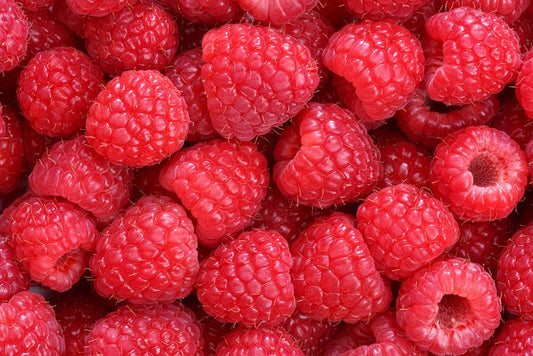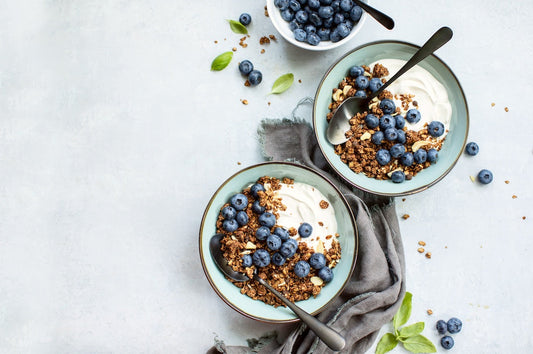Muscle building and weight training have experienced a real hype in recent years. Fitness studios are offering more and more affordable subscriptions and more and more people are enjoying the benefits of weight training. However, just going to the gym is not enough to ensure that muscle building is successful. Nutrition, lifestyle and often the right supplements also play an incredibly important role. In addition to regular exercise sessions, the right, healthy diet is of the utmost importance. In today's blog post, we will tell you which nutrition plan is best for promoting muscle building and what other important factors there are.
Discover our Verival Protein Breakfast
Muscle building – the most important facts and figures
It should be common knowledge that muscle building doesn't just happen in the gym. Carbohydrates, proteins and fats – the holy trinity for proper nutrition to build muscle . So eating right is the be-all and end-all if you want to shape your body.
During weight training, your body uses a lot of energy. This energy is usually measured in kilocalories and is used by your body during training. For your muscles to gain mass, the regeneration phase must go ideally. During training itself, you injure your muscles and small tears develop in the muscle itself. For muscle building to work, you have to fill these tears! Your body does this automatically, but it needs the right nutrients to do so.
Proteins, fats and carbohydrates – the frontrunners in muscle building
Proteins, fats and carbohydrates are the most important nutrients. Proteins are stored in the injured muscles and ensure that your muscles repair themselves and thus grow.
Fats provide a lot of energy, as 1g of fat provides 9 kcal. When building muscle, it is the unsaturated fatty acids that are important. Vitamins are also fat-soluble – if vitamins are not consumed with fat, you will excrete them again.
Carbohydrates also provide your body with a large amount of energy. Carbohydrates are actually forms of sugar that your body converts into energy. In addition, carbohydrates ensure the right metabolism between proteins and fats!
With the determination of the total energy turnover for functional muscle building
When it comes to nutrition in connection with muscle building, you first have to consider your total energy expenditure. It is important to determine how many calories you burn in one day so that you can adjust your diet in the right direction.
The total energy expenditure is made up of the basal metabolic rate and the active metabolic rate. The basal metabolic rate describes all the “expenses” your body has to incur during the day. This includes organ activity and cardiovascular functions, as well as all the other functions your body has to perform every day. Your basal metabolic rate depends on your age, gender, muscle mass percentage and physical performance level.
The basal metabolic rate is difficult to determine and very individual. It depends on your job, your level of physical activity and also your leisure activities.
With the Verival calorie calculator, we can quickly and effectively help you calculate your calorie requirement and thus give you a little help with muscle building.
With the Verival calorie calculator to perfect muscle building
How do you actually create an eating plan?
The most important fact for creating an effective nutrition plan is that you should expect a calorie surplus of 300-500 kcal per day. This gives your body a buffer to build muscle.
Before you create your nutrition plan, it is important to know what your body is currently in. How much do you sleep? How much do you work? Do you have stress? How much exercise do you do? Gender, age, weight and BMI are also important metrics. You should also know which foods you tolerate well and whether you have any allergies.
Then you should calculate your total energy expenditure so that you know how many calories you burn and how many you need per day. It is also advantageous to determine your PAL value (physical activity level) so that you have a more precise overview of your intake.
You should also define goals for yourself in advance. Where do you want to go? If you have a goal in mind, it's also easier to train.
The real task then is to find the right foods. Sufficient proteins, fats and carbohydrates are extremely important. At least 3 meals a day and smaller snacks throughout the day are the key to success.
What is important for building muscle?
There are a few basic rules for building muscle. Muscle building happens when you push your muscles beyond your performance level during training. The goal is to tire the muscle and give it new stimuli. During the regeneration period, the muscles then adapt to the new level. At least in theory.
But it's not that simple. Because only with strength training alone you quickly reach the limit in muscle building. Because: strength training is a very important asset in the whole process of building muscle, but without the right nutrition, your muscle will eventually “stop” and will no longer get bigger.
The most important nutrients for muscle building are protein, fat and carbohydrates. You should always consume enough of these in the sense of healthy sports nutrition. Because without these nutrients, your progress will be rather sober.
Proteins are the building block of every muscle. Without proteins, there is no muscle building. The higher your training intensity, the greater your body's need for protein. This means that the more intense and the more often you train, the more protein your body needs. Normally, 1 gram per kilogram of body weight is enough to cover your protein needs – but with enough training, one gram quickly becomes 1.5 grams!
The macronutrient distribution for muscle building
We have discussed the right nutrients for muscle building in detail. Proteins, fats and carbohydrates. But what is the right distribution between them in a healthy diet for muscle building?
Depending on the phase of your training, the macronutrient distribution also adapts.
If you want to lose weight, the following distribution is recommended:
20-30% carbohydrates, 25-30% proteins, 30-35% fat
For muscle definition, the following distribution is suitable:
30-40% carbohydrates, 25-30% proteins, 25-30% fat
For muscle building, the following distribution of macronutrients is suitable:
55-60% carbohydrates, 20-25% proteins, 15-20% fat
The best foods for successful muscle building
In order to build muscle effectively, your diet is of the utmost importance. Because muscles are not only built in the gym, but also directly “on your plate”. We have summarized which foods are particularly suitable for building muscle here.
Oats
Oats are a miracle food for building muscle. This local superfood contains a full 14% protein and also keeps you full for a long time due to the many complex carbohydrates. Many people swear by oats and porridge, especially for losing weight! With its many nutrients and vitamins, oats are a real “health bomb” and help prevent many ailments. It is especially important at breakfast time to make sure you are getting the right nutrients, and oats in all their different forms are perfect for helping you do that! Oats should be a constant companion for vegetarians and vegans in particular – even without meat and with a vegetarian diet, it is easy to gain muscle.
Legumes
Legumes help you build muscle just like oats. Kidney beans, lentils, chickpeas and peas should be a staple in your diet because they all contain over 20 grams of protein per 100 grams. Iron is another substance that is just as important for the body when building muscle and, as luck would have it, legumes are full of it.
Eggs
Eggs are probably the most obvious food on this list. Protein is the central substance in muscle building, which is why eggs are an important asset on the menu. Eggs have a high biological value and the nutrients in an egg can be utilized extremely well by your body. Incidentally, the most protein is found in the egg yolk.
Fish and meat
Fish is one of the main sources of the important omega-3 fatty acids. Many types of fish also have a low fat content and are high in protein. Salmon, for example, is one of the most valuable fish for building muscle.
You should be careful with meat, because excessive consumption can be more of a hindrance to muscle building. Red meat in particular should be enjoyed with caution, although iron and proteins are also good sources of these nutrients. The best type of meat for muscle building is poultry – chicken, turkey, duck or goose are full of protein.
Cottage cheese
High-fiber cottage cheese is currently trending among many athletes. With its many benefits and high protein content, it is perfect for muscle-building nutrition. It is ideal as a snack between meals with a slice of whole grain bread.
Nuts, seeds, kernels
Nuts, seeds and kernels are very nutritious and suitable for any diet. With their many healthy fats, they provide the energy you need to build muscle and make you shine during training. But be careful: nuts are high in calories and should therefore only be consumed in moderation. Therefore, you should limit yourself to one to two handfuls of nuts per day. Our tip: Almonds are very effective for building muscle and you should definitely consider them in your diet plan.
How to create your own diet plan for muscle building
First of all: you can certainly create a simple diet plan yourself, but for a complex diet plan, you should consult a professional to be on the safe side.
In any case, you should start with an analysis of your body. How many calories do you consume per day and how many calories should you eat to achieve a decent surplus? Once the first step is taken, it's time to determine your goals – where do you want to go with your body?
Once you have defined your goals, it's time to get down to business: which foods can be combined with your training plan to achieve the best results? You should be careful not to base your nutrition plan on specific values alone. It's important that you also eat foods that you like. Because it's very difficult to train when you're unhappy! The right spices and tasty side dishes can help you turn a boring dinner into your new favorite meal.
Another important aspect of a successful nutrition plan for muscle building is consistency. There are bound to be days when you'd rather just eat pizza or fast food – and you shouldn't give that up completely – but building muscle successfully also takes stamina!
Don't let yourself be thrown off course at the beginning. Finding the right diet is hard. It can often take several weeks. Trial and error is part of the experience. Amid all the hustle and bustle, don't forget that eating should be fun first and foremost.
To give you a few ideas of what foods might work well for you, we've put together a few recipe ideas for muscle building:
Green Protein Waffles with Tomatoes
You can top your protein snack however you like. We'll show you two simple and quick options.
Ingredients
- 1 Green Protein Waffle
- 4-5 cherry tomatoes
- ¼ onion
- Basil
- Olive oil
- Sea salt
Preparation
- Cut the tomatoes and onion into small cubes and mix with a dash of olive oil and sea salt.
- Top the Green Protein Waffle with the mix and add a little basil.
Topped Green Protein Waffles with Cottage Cheese
Ingredients
- Green Protein Waffle
- 4 tsp cottage cheese
- cress
- cucumber
Preparation
- Spread the cottage cheese on the protein waffle.
- Add a little cress and cucumber slices.

Green Protein Waffles with Tomatoes
Ingredients
- 1 Green Protein Waffle
- 4-5 cocktail tomatoes
- ¼ onion
- Basil
- Olive oil
- Sea salt
Preparation
-
Cut the tomatoes and onion into small cubes and mix them with a dash of olive oil and sea salt.
-
Top the Green Protein Waffle with the mix and add a little basil.

Green Protein Waffles with Cottage Cheese
Ingredients
- Green Protein Wafer
- 4 tsp cottage cheese
- Cress
- Cucumber
Preparation
-
Spread the cottage cheese on the protein waffle.
-
Add a little cress and cucumber slices on top.

Protein Cereal Bar Almond Fig
Ingredients
- 180 g Verival Grain Free Sport Protein Muesli Almond Fig
- 120 g low-fat quark
- 3 tbsp flaxseed crushed, as an egg substitute
- 50 ml hot water
- 15 g almonds
- 30 g dried apricots
- 3 tbsp maple syrup
- 1 tablespoon lemon juice
Preparation
-
Preheat the oven to 170°C circulating air.
-
Line a rectangular baking pan (approximately 32cm x 24cm) with baking paper.
-
Prepare the egg substitute: Mix the flax seeds with 50 ml of hot water and let them swell for 5 minutes.
-
Coarsely chop the almonds and apricots.

-
Mix the protein muesli and the low-fat quark.

-
Then add all the remaining ingredients and mix everything together well.

-
Pour the dough into the prepared baking pan and smooth out.
-
Bake in the oven for 20 to 25 minutes.
-
Cut the dough into 15 pieces while still hot and allow to cool.
























